Glycomet 850MG Tablet (10’s)
Glycomet 500MG is a potent medication used extensively to control blood sugar levels in patients suffering from type-2 DM (type 2 diabetes) mellitus. The active ingredient in this medication, Metformin, is a biguanide derivative that functions as an antihyperglycemic agent. Metformin reduces glucose production by the liver, decreases intestinal absorption of glucose, and improves insulin sensitivity in peripheral tissues. These collective actions ultimately control blood sugar levels and reduce the risk for potential complications related to diabetes. The medication is most efficacious when integrated with a consistent exercise regimen and a balanced diet.
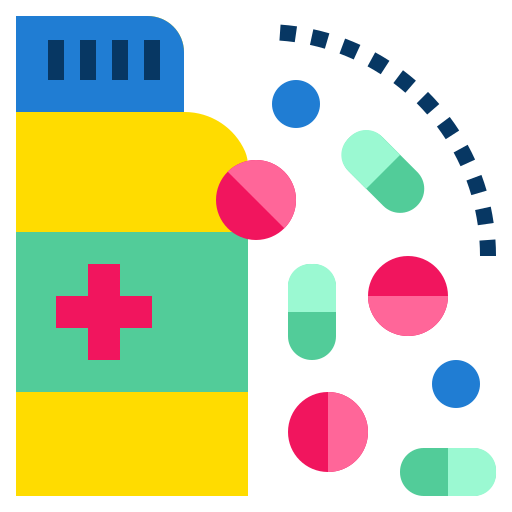
Essential Drug Facts
| Dosage form | Oral Tablet |
|---|---|
| Chemical Class | Biguanides Derivative |
| Habit Forming | No |
| Systemic Category | Endocrine & Metabolic System |
| Action Class | Biguanides |

What are the Indication / Medical Uses of Glycomet 850MG Tablet (10’s)
Glycomet 500MG Tablet is primarily used for the management and treatment of type-2 DM (type 2 diabetes mellitus), most notably in overweight patients, when dietary alterations and exercise alone fail to maintain glycemic control. Additionally, Glycomet is also indicated in the management of Polycystic Ovary Syndrome (PCOS), a hormonal disorder that affects women of reproductive age.

How Does Glycomet 850MG Tablet (10’s) Benefit You?
Glycomet 500MG Tablet is a medication that is designed to manage elevated blood glucose levels in patients who have been diagnosed with type-2 DM (type-2 diabetes mellitus). By maintaining glycemic control, this medication can help to stave off serious complications of diabetes, including nerve damage, kidney damage, limb loss, and blindness. Proper maintenance of blood sugar levels can also reduce the risk of stroke and heart attack.
.svg)
Glycomet 850MG Tablet (10’s) Action Mechanism
The active ingredient in Glycomet 500MG, Metformin, works by reducing the amount of glucose your liver produces and your intestines absorb. The medicine also improves the body's response to insulin, a hormone naturally generated by the pancreas that regulates the quantity of glucose in the blood. This combined effect reduces blood sugar levels, subsequently allowing the body to manage and cope with type 2 diabetes mellitus.

How should Glycomet 850MG Tablet (10’s) be used
Glycomet 500MG Tablet is typically consumed orally, most often from one to three times daily, or as directed by your healthcare provider. The dosage is primarily determined by the patient's medical condition and their response to the treatment. The tablet should be taken during or right after meals to prevent an upset stomach.

When is the best time to take Glycomet 850MG Tablet (10’s) ?
For optimal absorption and to minimize potential gastrointestinal side effects, Glycomet 500MG Tablet should be taken with your meals. If the dosage plan is once daily, the ideal time would be with the evening meal.

How does it affect me if I overdose?
An overdose of Glycomet 500MG Tablet could lead to a condition known as lactic acidosis, a metabolic complication that can be life-threatening. Symptoms may include slow or irregular heartbeat, stomach discomfort, lightheadedness, extreme fatigue, muscle pain, or difficulty breathing. If experienced, immediate medical attention is necessary.
.svg)
How does it affect me if I miss a dose?
Missing a dose of Glycomet 500MG Tablet can elevate your blood sugar levels, impeding the intended regulation of your diabetes. If you miss a dose and remember it soon after, take it as soon as possible. However, if the next dose is due soon, it is recommended to continue with the following dose and skip the missed one to prevent double dosing.

Drug Adverse Reactions of Glycomet 850MG Tablet (10’s)
Common side effects associated with Glycomet 500MG Tablet include diarrhea, nausea, upset stomach, and a metallic taste in the mouth. More severe reactions may occur, such as lactic acidosis, especially in renal-impaired patients, lowered blood sugar levels (hypoglycemia), vitamin B12 deficiency, and skin reactions. If you happen to suffer from any serious adverse reactions, don't hesitate to get in touch with your doctor (healthcare professional) without delay.

Glycomet 850MG Tablet (10’s) Tablet is contraindicated in following conditions
Glycomet 500MG Tablet is not recommended for patients with severe kidney disease or failure, acute or chronic metabolic acidosis including diabetic ketoacidosis with or without a coma, those undergoing radiologic studies with iodinated contrast materials, and those with known hypersensitivity to metformin.

Glycomet 850MG Tablet (10’s) Safety Warnings and Precautions

The risk of lactic acidosis escalates if you consume alcohol while taking Glycomet. Hence, limit alcoholic beverages while on this medication.

If you have a known hypersensitivity to metformin or any of its components, Glycomet should not be used.

Although Glycomet can be used during pregnancy if clearly needed, it should be discussed with your healthcare provider to evaluate potential risks to the fetus.

The safety and effectiveness of Glycomet in children under ten years old have not been established. Always consult a healthcare provider before administering this medication in children.

Metformin is considered generally safe to use during breastfeeding as it is excreted into human breast milk in small quantities.

Glycomet 500MG generally does not influence your ability to drive as it does not induce drowsiness.

Glycomet 500MG Tablet is contraindicated in patients with serious renal impairment. Metformin levels increase with declining renal function, and this can lead to lactic acidosis.

Patients with lung diseases and other conditions that might affect the lung function could have a higher risk of developing lactic acidosis.

Glycomet 500MG Tablet should be used with caution in patients with liver disease, as this can increase the risk of lactic acidosis.

The use of Glycomet should be used with caution in patients with heart disease due to a potential increased risk of cardiovascular complications.

Interactions between Glycomet 850MG Tablet (10’s)
Glycomet 500MG Tablet may interact negatively with other medications. Notably, diuretics, corticosteroids, phenothiazines, thyroid products, oral contraceptives, and others may induce hyperglycemia when combined with Metformin. Always inform your healthcare provider about other medications you are taking to prevent potential drug interactions.

How to store and dispose of Glycomet 850MG Tablet (10’s)
Glycomet 500MG Tablet should be stored in a dry and cool environment, away from direct heat and light. The medication should be kept out of reach of children. When disposing Glycomet, do not flush the medicine down the toilet or throw it into the drain. Instead, return it to a takeback program or follow the instructions provided by your physician (healthcare professional).

Here are a few quick tips for Glycomet 850MG Tablet (10’s)
Glycomet 500MG Tablet is most effective when paired with a balanced diet, regular physical activity, and routine blood sugar level monitoring. It is recommended to take your medication at the same time each day for optimal results and to increase the likelihood of remembering your daily doses. Regular kidney function evaluation, especially in elderly patients, is important. Furthermore, periodically checking your blood sugars and maintaining regular eye examinations to monitor for potential diabetic eye problems is advisable.

Parameters that should be monitored Glycomet 850MG Tablet (10’s)
The efficacy of Glycomet 500MG Tablet can be monitored by regular checking of fasting and postprandial blood glucose levels, glycosylated hemoglobin (HbA1c), and even fructosamine levels in some cases.

Considerations related to diet Glycomet 850MG Tablet (10’s)
Maintaining a balanced diet with an equal distribution of proteins, carbohydrates, and fats across meals assists in managing blood sugar levels. Emphasis should be on whole-grain foods, fruits, vegetables, lean proteins, and avoiding excessive consumption of sweets and sugary drinks.

Question and Answer (FAQ)
Q: What is Glycomet 500MG Tablet used for?
A: Glycomet 500mg Tablet manages blood sugar levels in type 2 diabetes. It reduces liver glucose production and improves insulin sensitivity. Follow your doctor's prescribed dosage and duration.
Q: How should I take Glycomet 500MG Tablet?
A: It is generally recommended to take Glycomet 500MG Tablet with meals to aid absorption and avoid potential stomach upset.
Q: What happens if I overdose on Glycomet 500MG Tablet?
A: Overdosing on Glycomet 500MG Tablet can lead to serious health consequences like lactic acidosis that requires immediate medical attention.
Q: Can I stop taking Glycomet 500MG Tablet on my own?
A: Stopping the use of Glycomet 500MG Tablet suddenly can escalate your blood sugar levels and might increase your risk for complications. Always consult your doctor (healthcare provider) before discontinuing any treatment.
Q: What if I miss a dose of Glycomet 500MG Tablet?
A: Don't worry if you miss a dose, take it when you remember. If it's almost time for your next dose, just skip it!
Q: Can I take Glycomet 500MG Tablet during pregnancy?
A: Glycomet can be used during pregnancy if absolutely needed. It is crucial to discuss the risks and benefits with your healthcare provider.
Q: Can I use Glycomet 500MG Tablet while breastfeeding?
A: Glycomet is considered generally safe during breastfeeding. However, you should always consult your healthcare provider before using any medication during breastfeeding.
Q: Can I consume alcohol while taking Glycomet 500MG Tablet?
A: The consumption of alcohol should be limited or avoided altogether while on Glycomet, as it can increase the risk for lactic acidosis.
Q: Is it safe to drive after taking Glycomet 500MG Tablet?
A: Glycomet does not generally interfere with driving abilities. However, if you experience certain side effects like dizziness or drowsiness, refrain from driving.
Q: Is Glycomet 500MG Tablet safe for use in children?
A: The safety and effectiveness of Glycomet in children under ten years old have not been established. Always consult a healthcare provider before administering this medication in this age group.

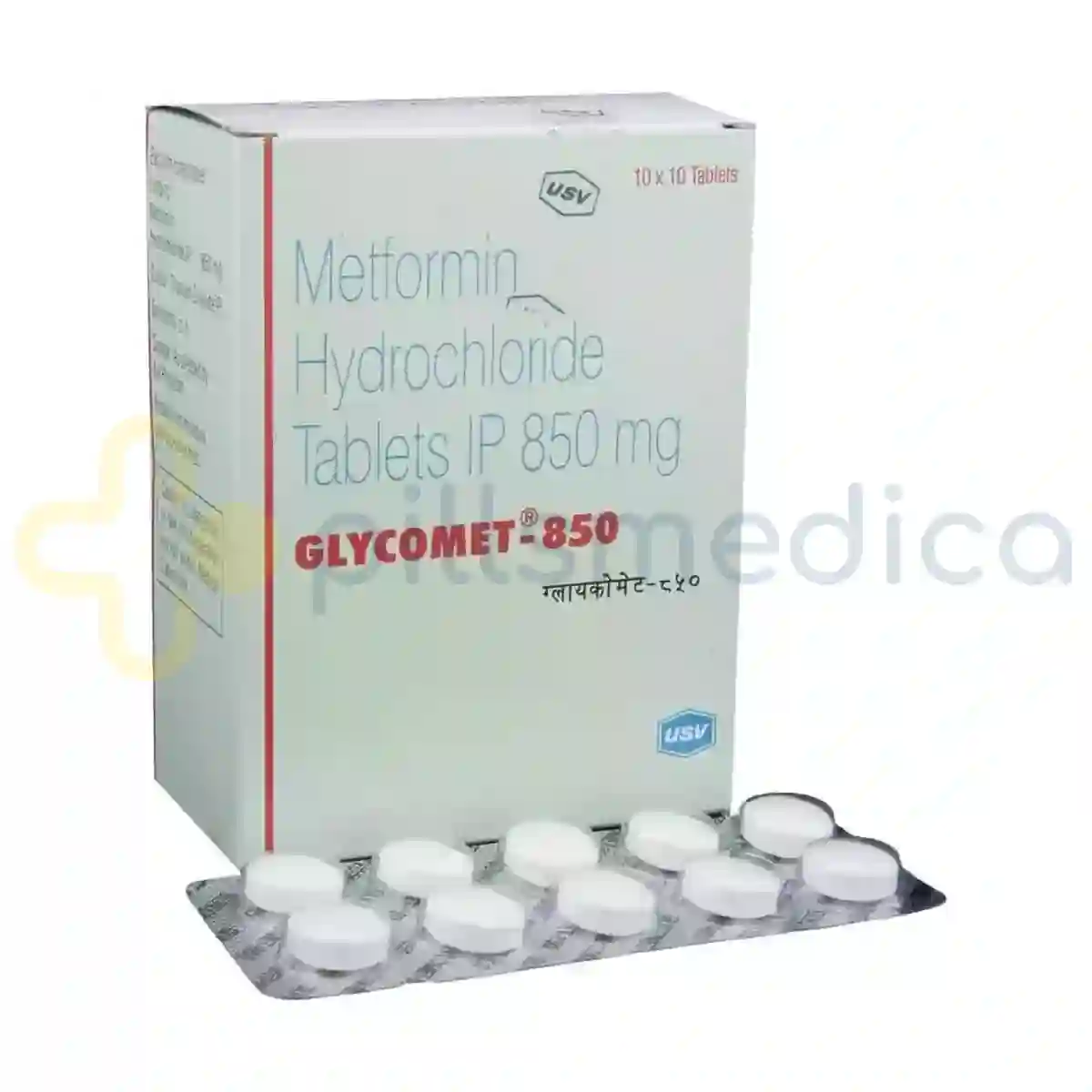
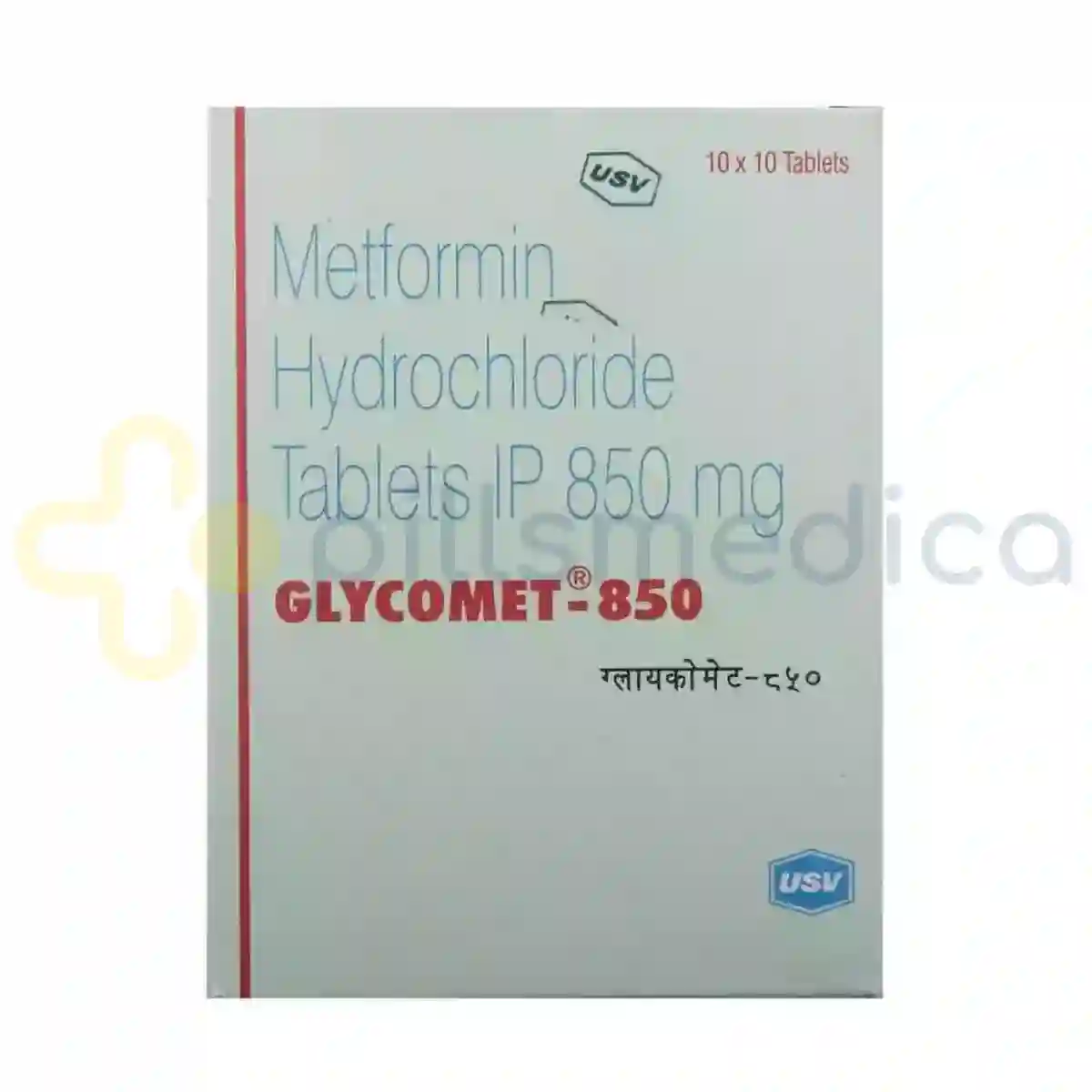
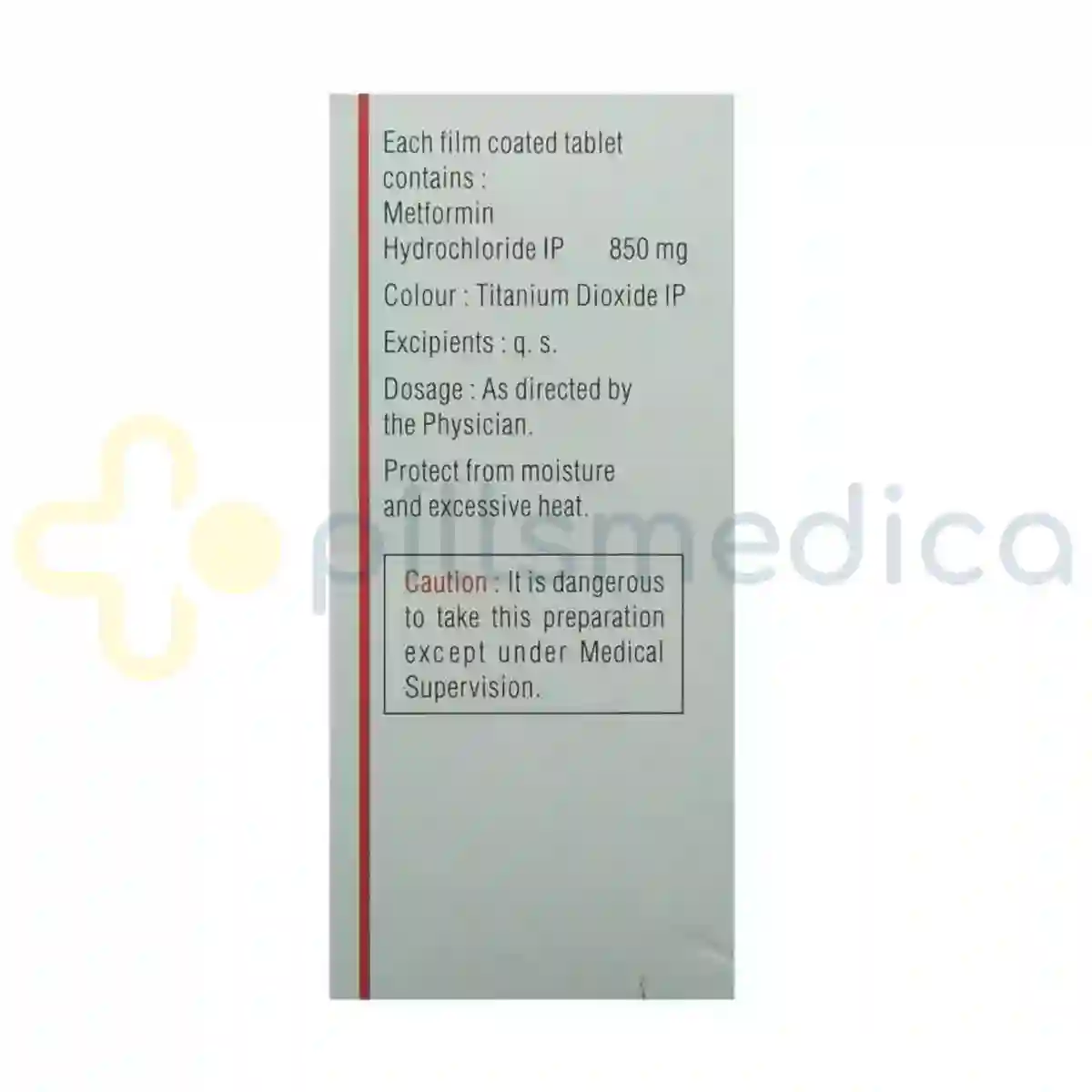
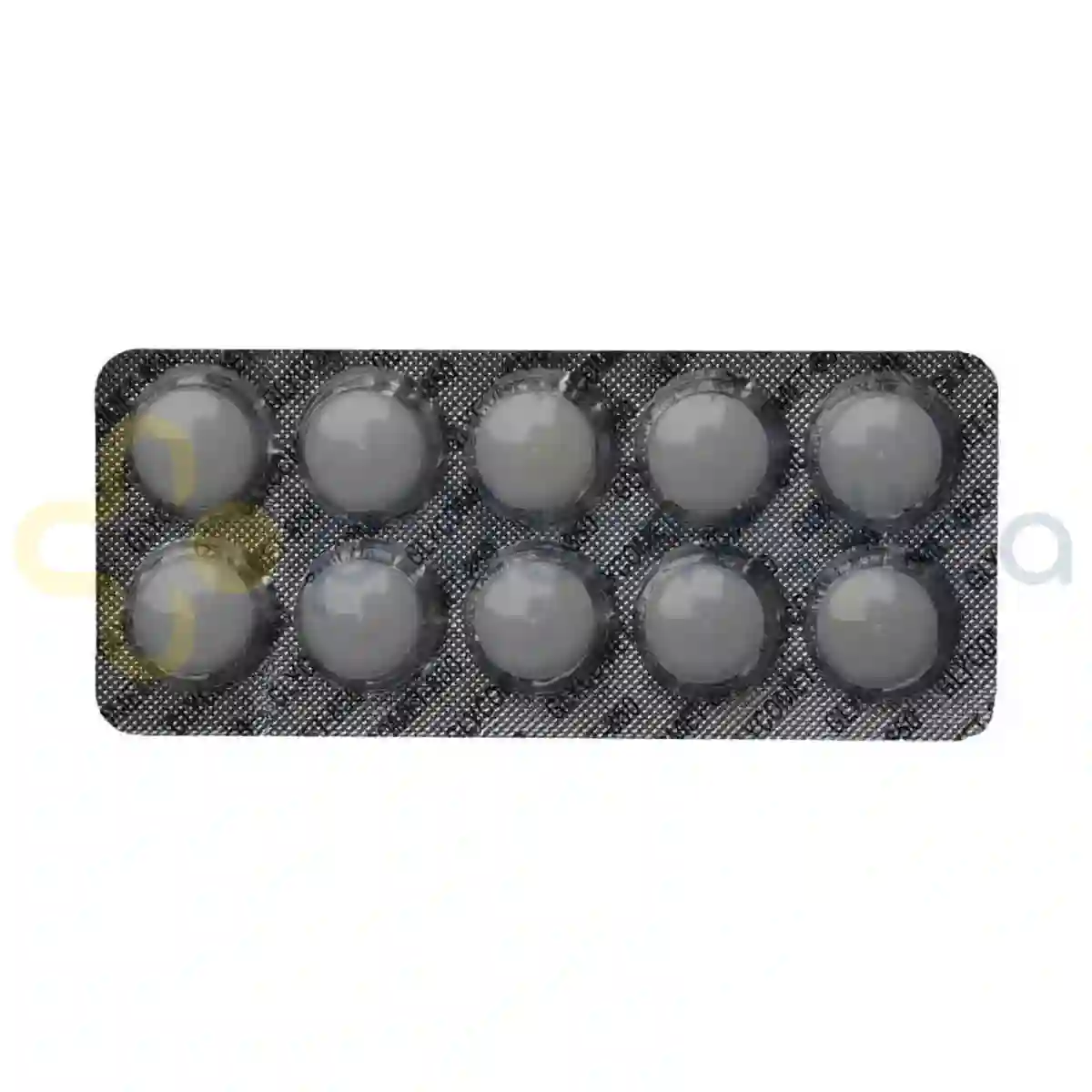


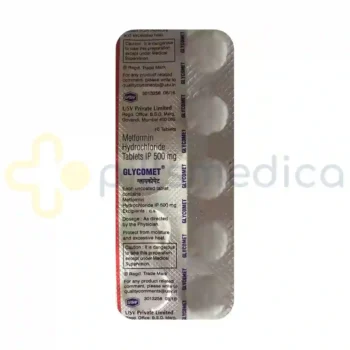
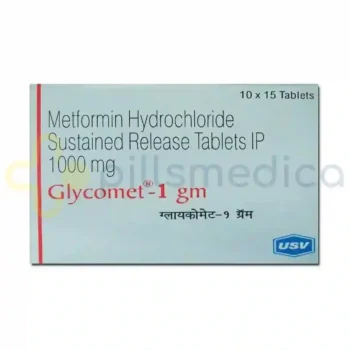



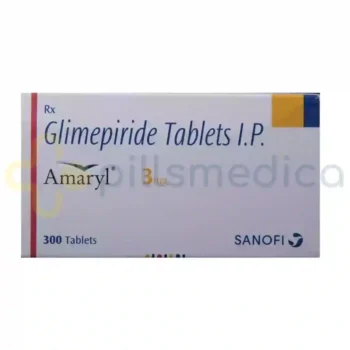
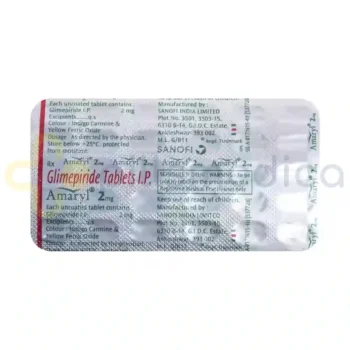
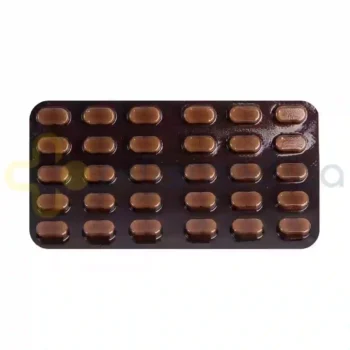

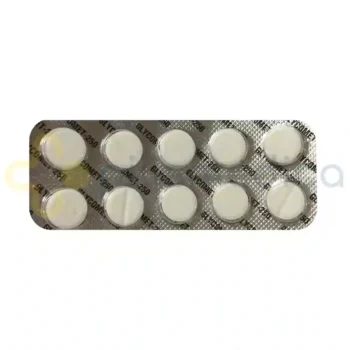
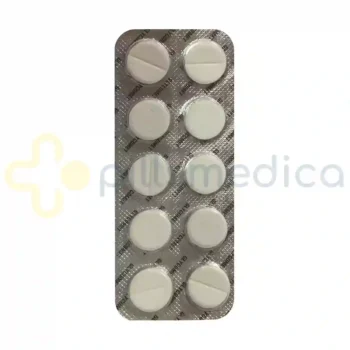
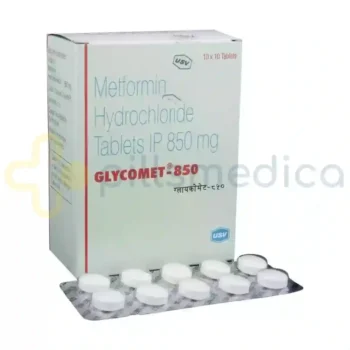



Reviews
There are no reviews yet.